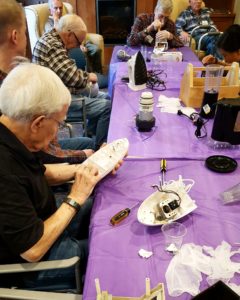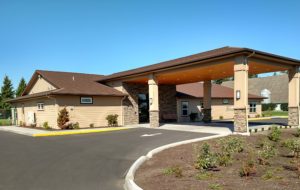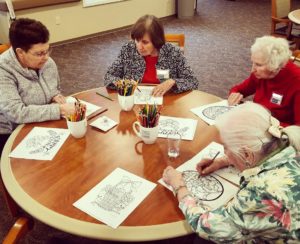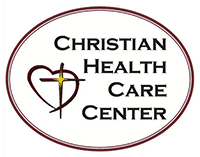Due to rising operational costs, stagnant revenues and increased governmental regulations, Whatcom County’s only adult day health program, Northwest Adult Day Health & Wellness Center, will close its doors on Aug. 10. Plans are in place to help transition as many clients and staff members as possible to other opportunities.
The center has been located in Lynden since August 2015, eight months after ownership of PeaceHealth St. Joseph Medical Center’s 37-year-old adult day health program transferred to Christian Health Care Center.
The role of adult day health

Northwest Adult Day Health & Wellness Center has been a place where older adults and individuals with chronic health conditions – diabetes, Parkinson’s, early onset Alzheimer’s – could build strength and maintain their independence with guidance from a number of on-site healthcare professionals.
NWADH clients had Monday through Friday access to special programs and wellness experts including an RN, social worker, Certified Occupational Therapy Assistant and therapeutic activity specialists.
Those wellness experts helped NWADH clients monitor their overall health, manage medications and improve balance and mobility. They also offered enriching programs that were designed to meet the physical, social, spiritual, creative and emotional needs of each client.
In addition, the center offered Caregiver Connection meetings in Bellingham and Lynden, which provided peer support and education for individuals serving in the role of family caregiver.
Decisions directed by a mission
“Opening an adult day health center in North Whatcom County originally fit well with Christian Health Care Center’s mission,” said CHCC’s CEO, Patrick O’Neill.
“Our mission guides us to provide a comprehensive range of health and supportive services. It also leads us to offer educational programs and work cooperatively with other organizations to assure that community needs are met.”

O’Neill said that while operating Northwest Adult Day Health & Wellness Center has been a meaningful way to live the mission, CHCC’s board and its leadership team are also tasked with ensuring all services and programs are provided in a way that maintains the financial integrity of Christian Health Care Center.
Even with the support of amazing community partners like Christ the King in Bellingham, Northwest Regional Council and Whatcom Transit, Christian Health Care Center has needed to significantly subsidize the program since its launch due to the overall cost of operating an adult day health program and a lack of program members to offset expenses.
“From the start, our board of trustees has fully supported NWADH,” said Don Kok, vice-chair of CHCC’s board of trustees and adult day health committee member. “We had approved the subsidization of this health and wellness program while staff was diligently working to increase enrollment to a level that would allow the program to at least break even or significantly decrease the financial gap. Rising costs and flat reimbursement rates prevented that goal from being achieved so we had to make the difficult decision to close the program.”
Not a viable business model, other options explored
Governmental reimbursement rates – how most NWADH clients pay for their services – have been stagnant since 2015. The rate governmental agencies pay NWADH to deliver services to their clients has only increased by 2.55 percent in the past three years. Meanwhile, operating expenses such as business insurance, supplies, wages and benefits, have increased well beyond that percentage.

NWADH staff have explored a number of alternate business models, such as reducing the program from five to four days per week. They also considered opening the program to developmentally disabled clients, opening on weekends, and converting the program into an adult day care center instead of operating as an adult day health program, which could have reduced operating expenses. However, those ideas did not prove to be viable options.
Due to current industry challenges and a business model that no longer works, NWADH leaders have decided that it would be impossible for this program to be passed on to another organization at this time.
An industry in crisis across America
Northwest Adult Day Health & Wellness Center has not been alone in its struggle to survive. The business model of capped revenues (Medicaid reimbursements) and rising expenses (insurance, wages and benefits, business expenses) is just not financially viable, leading to closures of adult day health programs across the nation.
In fact, North Carolina’s total number of adult day health centers dropped from 125 to 85 in recent years. Adult day health programs have closed in Colorado, California, Pennsylvania and elsewhere.
Earlier this year, NWADH staff spoke with 14 adult day health programs in Washington state. Many of them were struggling financially; many relied heavily on financial help from other organizations, donors, fundraisers and grants.
What’s next for NWADH?
NWADH was required to provide a 30-day notice to clients and contracted community partners. That notice was given on July 10, 2018.
Aug. 10 is the last day clients can attend the program in Lynden.
“Our focus between now and August 10 is on providing adult day health clients and their families with information about other resources they may be able to access in Whatcom County,” said Patrick O’Neill.

NWADH leaders have compiled and shared with the families of program members a list of alternative resources, including options for adult day care, in-home care and assisted living.
CHCC leaders are also exploring options for reassigning as many NWADH staff members as possible. Some existing and new roles at Christian Health Care Center will be offered to NWADH staff.
“Our staff worked with passion and diligence,” Don Kok said. “They served NWADH members incredibly well and served families with grace, compassion and dignity during a challenging period in their lives. CHCC’s board is completely committed to these individuals; we want to make sure they are taken care of as this program ends.”
O’Neill reports that many people have asked about the future of the building at 851 Aaron Drive – a 5,400 square foot building with office spaces, meeting rooms, a kitchen and accessible rest rooms.
“We’ll sort that out later,” he said. “It’s truly the people inside the building – clients, staff, families – who matter most. They are top-of-mind for us right now.”
